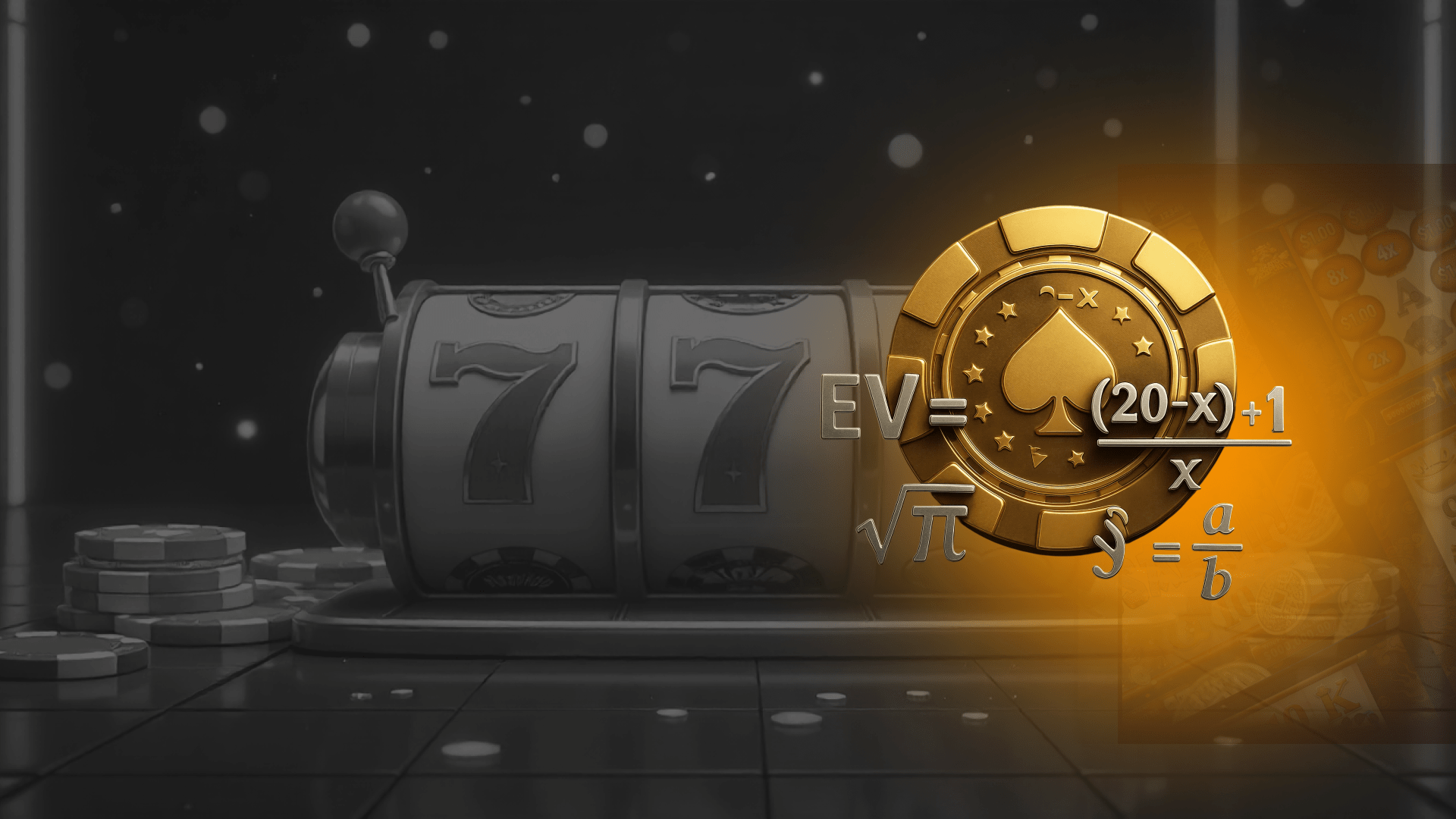Casinos run on mathematics as much as on entertainment. Behind every spin, shuffle, or roll lies a calculated balance of chance, profitability, and fairness. Understanding casino math helps explain why gambling is both engaging for players and sustainable for operators.
For professionals in iGaming, knowledge of gambling mathematics is essential. It informs game design, operations, compliance, and risk management. From expected value to volatility, casino math provides the foundation for how games are created, monitored, and optimized.
Probability and Randomness in Casino Games
The starting point of gambling math is probability. Every outcome in casino games is tied to chance. The probability of roulette landing on black, or a card being drawn from a deck, can be computed precisely.
- Probability in casino games is measured as the ratio of favorable outcomes to total possible outcomes.
- Random number generators (RNGs) in online gaming simulate this randomness digitally.
- Variance determines how results spread over time, shaping whether players see small frequent wins or rare big payouts.
A solid understanding of gambling mathematics ensures fairness and prevents predictable patterns. Casinos rely on randomness to produce consistent results that align with their expected edge.
House Edge and Return to Player (RTP)
The most important concept in casino math is the house edge. This is the percentage advantage the casino holds over the player in the long run.
How casinos ensure long-term profitability
Casinos profit not by beating individual players but by relying on the law of large numbers. Over thousands of plays, the house edge guarantees predictable revenue.
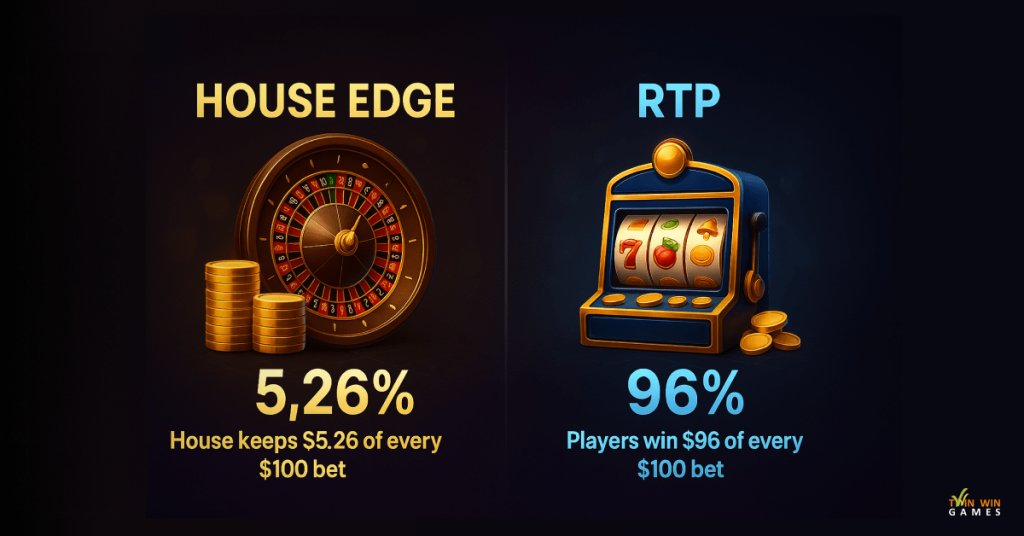
House edge vs. RTP explained with examples
- House Edge: If roulette has a 5.26% house edge, the casino expects to earn $5.26 for every $100 wagered.
- RTP (Return to Player): If a slot machine has 96% RTP, it is expected to return $96 for every $100 bet over time.
Both terms describe the same relationship from opposite perspectives: operator profit vs. player return.
Common misconceptions about house advantage
Many players think casinos always win every game. In reality, short-term outcomes are unpredictable. Players can win big, but across thousands of sessions, the math ensures the operator remains profitable.
Here is how house edge and RTP compare across popular casino games.
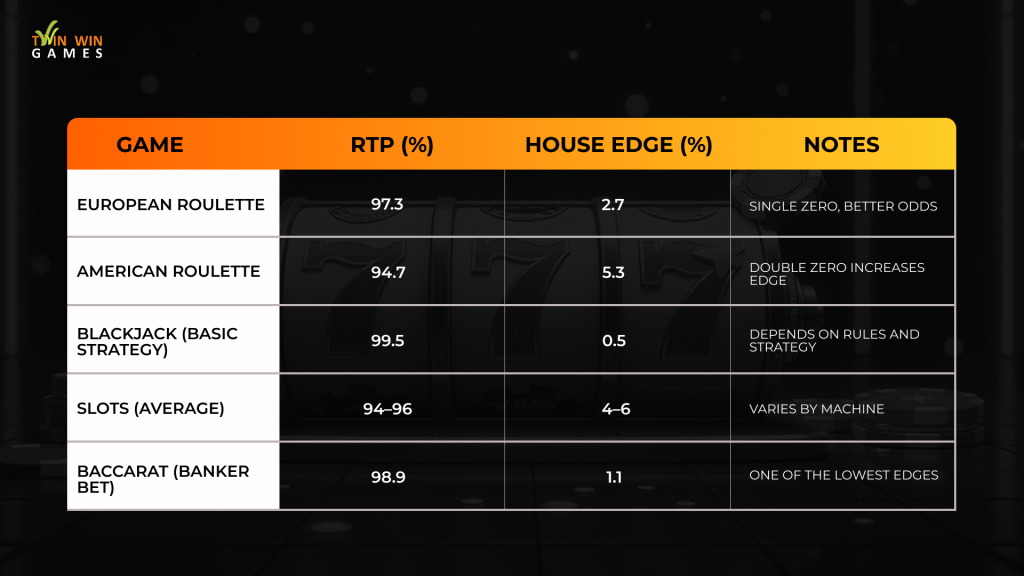
Expected Value and Volatility
Expected value (EV) measures the average result of a wager if repeated many times. It is the backbone of gambling math. A negative EV means the player loses in the long term, which is true for most casino bets.
Volatility (or variance) explains the swings in results. High-volatility games like progressive slots deliver rare but large wins, while low-volatility games like baccarat produce smaller, steadier returns. Together, EV and volatility define the player experience and the casino’s revenue profile.
Mathematics in Casino Operations
Math is not limited to games themselves. It drives casino management and daily decision-making.
Key performance metrics: handle, drop, win, and hold
- Handle: total amount wagered.
- Drop: cash exchanged for chips.
- Win: the difference between handle and payouts.
- Hold: percentage of drop retained by the casino.
Why hold percentage is crucial for operators
Hold percentage determines profitability across table games and slots. Operators track hold closely to forecast revenue and adjust floor layouts or game mixes.
Casino revenue depends on different streams. The chart below shows a typical breakdown for many operators.
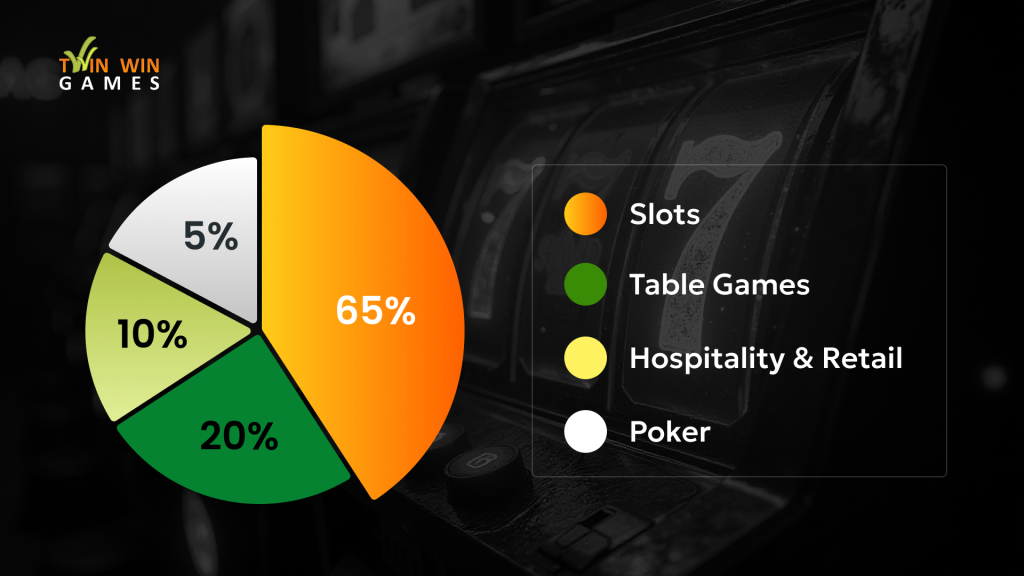
Daily Operations Reporting (DOR) and its role in decision-making
Casinos use DOR to analyze results in real time. These reports combine gambling math with performance metrics to guide staffing, promotions, and compliance checks.
Game Design and Player Engagement
Behind every game is a design choice balancing entertainment with profitability. Casino mathematics ensures games feel fair, while still providing a margin for operators.
Balancing fairness, entertainment, and profitability
- Fairness: transparent odds, certified RNGs, and regulated payouts.
- Entertainment: themes, visuals, and features that enhance engagement.
- Profitability: maintaining house edge while offering rewarding experiences.
Game developers integrate math models into slots, table games, and hybrid products. For example, a new slot may combine a 96% RTP with bonus rounds to increase retention.
Slot machine probability mathematics determines both the frequency and size of payouts through weighted reel strips and symbol combinations. Modern slots use complex algorithms where each symbol has a programmed probability, creating millions of possible outcomes while maintaining the target RTP. Understanding these mathematical models allows developers to craft games that deliver the right balance of hit frequency and jackpot potential.
Twin Win Games applies these principles in slot game development to deliver both engaging and mathematically sound products.
Risk Assessment and Surveillance Through Math
Casino operations use math to detect risks and maintain integrity.
How casinos use data to detect anomalies
Statistical monitoring identifies unusual betting patterns or outcomes. If results deviate from expected probability, systems flag potential cheating or malfunction.
Mathematical models in fraud prevention and security
Regression models, variance analysis, and predictive algorithms help track irregular play, card counting, or suspicious account behavior in online platforms.
Applications beyond the gaming floor (hospitality, retail inside casinos)
Mathematics also supports non-gaming revenue. Hotels, restaurants, and retail areas use predictive models for pricing, staffing, and customer engagement, maximizing overall profitability.
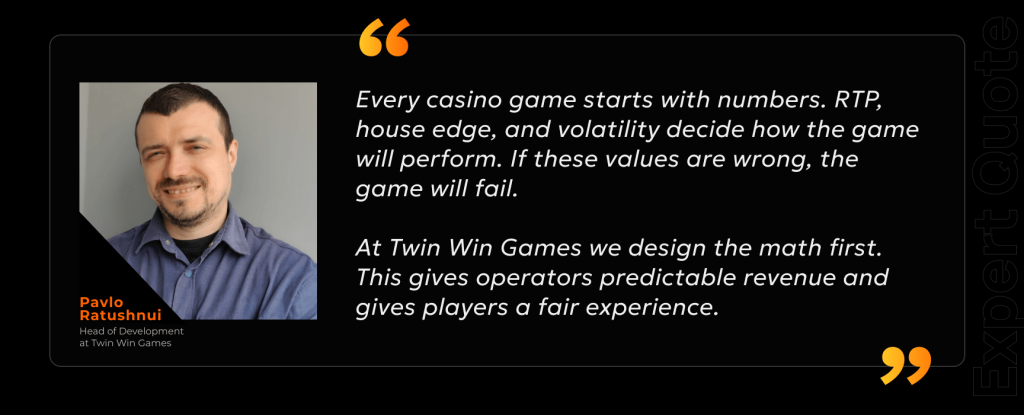
Key Takeaways
Understanding casino math means seeing beyond chance into the structured calculations that make gambling sustainable. From probability to house edge, expected value, and operational metrics, every decision is rooted in mathematics.
For operators and studios, applying these principles ensures fairness, compliance, and profitability. Twin Win Games supports this balance with advanced casino game development services that integrate strong mathematical foundations into every project.
FAQ
Can players beat the math behind casino games?
In the long run, no. The house edge ensures profitability for the operator. Players may win short-term, but probability favors the casino over time.
How do casinos use mathematics to ensure profitability?
They design games with built-in house edges, track hold percentages, and use performance metrics. This ensures predictable returns across large volumes of play.
What are the most common mathematical misconceptions about gambling?
That players can “beat the system” with luck alone, or that games are rigged against them. In reality, randomness governs short-term outcomes, while mathematics governs the long-term results.
